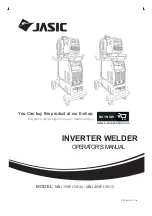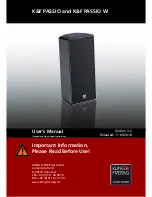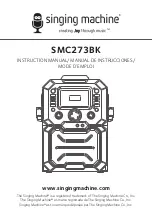
9
Getting Started
Installing the Equipment on the Wall
The Center Unit and Speakers can be attached to a wall.
CAUTIONS:
Attachment to a wall
• The Center Unit weighs approximately 4.3 kg (9.5 lbs). When its buttons are operated, an additional force
will be applied to it in the downward direction. Therefore, sufficient care must be taken when attaching
to a wall to prevent any accidents caused by the Center Unit’s falling off the wall.
• Before attaching the Center Unit to the wall, check the wall and other related aspects, and verify whether
the strength of the wall will be sufficient not only to support the weight of the Center Unit itself but also
to withstand the additional downward force which will be applied to it during operation. (Do not attach
the Center Unit to a plywood or plasterboard wall. The Center Unit may fall and sustain damage as a re-
sult.) If you do not know the strength of the wall and other aspects, consult a qualified service person.
• The screws needed for attachment are not supplied. Use screws which are compatible with the strength
and material of the pillar or wall.
• When attaching the Center Unit, the screws must be secured tightly in all three locations. Attaching the
Center Unit to the wall by making only one or two holes for the screws makes for an unstable attachment
and causes a safety hazard as the Center Unit may fall down.
Location of attachment to a wall
• Care is required in selecting a location for attaching the Center Unit to the wall. Injury to personnel, or
damage to the Center Unit, may result if the Center Unit is attached in a location which interferes with
daily activities or a location that the users are liable to knock their bodies or heads against.
• Avoid a location above a bed, sofa, water tank, sink, etc. or in a passage.
Example of attachment (Center Unit)
The procedure below is intended merely to illustrate how the Center Unit
can be attached to a wall and does not make any guarantees for safety
while using the Center Unit on a wall. Take into account such factors as
the material and strength of the wall, the status of the reinforcing materi-
al, and the possible changes that will take place over time.
• The cords must be connected to the Center Unit before attaching to a
wall. (See page 4.)
1. Select the place (wooden wall) where the Center Unit is to be attached.
Avoid a plywood or plasterboard wall.
2. For reinforcement purposes, prepare the wooden board which will be
used to attach the Center Unit to the wall. Before proceeding, check
the position of the supports inside the wall.
Have ready a sturdy board.
• Thickness: 9 to 15 mm (
3
/
8
"
to
5
/
8
"
)
• Height: Higher than the unit
• Width: Wider than the distance between the two supports
3. Attach the board to the wall. Anchor the board securely in at least four
places to the supports inside the wall. The screws used must have a di-
ameter of at least 4 mm (
3
/
16
"
) and a length equivalent to 3 times the
thickness of the board mounted on the wall plus the thickness of the
wall itself.
4. Mount three screws (not supplied) onto the board which has now been
mounted on the wall. (See the diagram below for the details of the
size.)
• The supplied paper pattern will assist in determining the positions
of the screws.
5. Hook the Center Unit onto the attached screws.
6. Slide the Center Unit to the side, and secure it.
• Adjust the screws if the Center Unit is not attached firmly.
COMPACT COMPONENT SYSTEM
6
1
2
3
4
5
Slide to left, then down.
6 - 9 mm
4 - 5 mm
3 mm
20 - 30 mm
(
3
/
16
" -
1
/
4
")
(
1
/
4
" -
3
/
8
")
(
13
/
16
" - 1–
3
/
16
")
(
1
/
8
")
(
1
/
8
")
Within 3 mm
Screw (not supplied)
Board
VS-DT6-8(J)_EN.book Page 9 Monday, January 21, 2002 5:05 PM













































